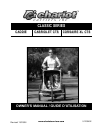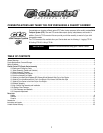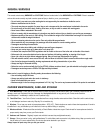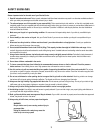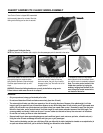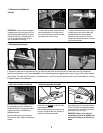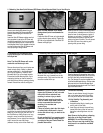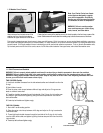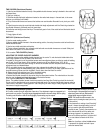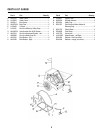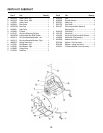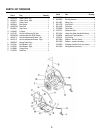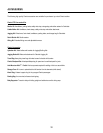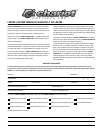
GENERAL
GENERAL
W
W
ARNINGS
ARNINGS
This manual contains many WARNINGS and CAUTIONS. Read and understand all of the WARNINGS and CAUTIONS. Failure to assemble
and use this carrier correctly may lead to serious personal injury or death to you or your passengers.
• Do not install a car seat or any other seating device not approved by the manufacturer inside the carrier.
• Make no modifications to the carrier.
• The carrier may become unstable if a parcel bag or rack not approved by the manufacturer is attached to the carrier.
• Do not allow any of the child’s body, clothing, shoe laces, or toys to come in contact with moving parts.
• Never leave children unattended in the carrier.
• Failure to comply with the manufacturer’s instructions may lead to serious injury or death to you and to your passengers.
• Maximum capacity of the carrier is 100 lb (45 kg). This includes the weight of the child/children and cargo. Do not use with
children who exceed the weight limitations.
• Do not use cleaning solvents on the carrier. Clean only with mild soap and water.
• When used with only one passenger, the passenger should be seated in a center seating position.
• Passengers must always use seat belts.
• Care must be taken when folding and unfolding to prevent finger entrapment.
• Never use your carrier to go up or down stairs or on steep hills.
• A reflector that complies with CPSC regulations shall be visible on the rear of the trailer and on the side of the wheels.
• Before each ride, ensure the attached carrier does not interfere with braking, pedaling, or steering of the bicycle.
• Never ride a bicycle at night without adequate lighting. Obey all local legal requirements for lighting.
• Ride with extreme caution, never exceed 25 km/h, and slow down to less than 10 km/h around corners and on rough roads.
• Use of a trailer changes the stability, braking requirements and riding characteristics of your bike.
• Always use flag for increased visibility.
• Before the carrier can be used with the Cycling CTS Kit, children must be at least 1 year old and able to sit upright unassisted.
• Passengers must always wear a CPSC or CE approved bicycle helmet.
When carrier is used in Jogging or Strolling mode, please observe the following:
• Use wrist safety strap at all times.
• Always use parking brake when the carrier is stationary.
• Never in-line skate with your carrier.
• Maximum weight in the rear storage compartment is 2.2 lb (1 kg). The carrier may become unstable if the pocket is overloaded.
CARRIER MAINTENANCE, CARE
CARRIER MAINTENANCE, CARE
AND ST
AND ST
ORAGE
ORAGE
A. Hitch Maintenance - Check that the hitch and back up straps are properly secured before every ride. Periodically check the hitch for
damage, cracks, etc. Replace at first sign of damage. Any damage/deterioration on any parts of your Chariot carrier should be
repaired/replaced immediately to reduce the risk of personal injury.
B. Fabric/Shell Care - Your Chariot Carrier is manufactured from a tough, durable, water resistant fabric. Clean fabric with household soap
or mild detergent and warm water only. Wipe dry. Do not machine dry.
C. Windows - Do not use your carrier in temperatures below -20ºC (-4ºF) . Plastic windows can crack at these low temperatures. If carrier is
stored/left out in very cold weather you will need to let it warm up before folding or uprighting.
D. Wheels and Axles - Wheels should be serviced by a Chariot Dealer at least twice a year. Check wheels for loose spokes and axles for
proper security every time you use your Chariot carrier.
E. Hardware and Fasteners - Regularly inspect nuts and bolts to ensure they are tightened securely.
F. Storage - Store your carrier in a dry, well-ventilated area. To avoid mildew, make sure carrier is dry before storing. Keep your carrier out of
the sun when not in use to reduce fading. Do not store the carrier attached to your bicycle.
Always inspect all parts every time you use your carrier!
2



